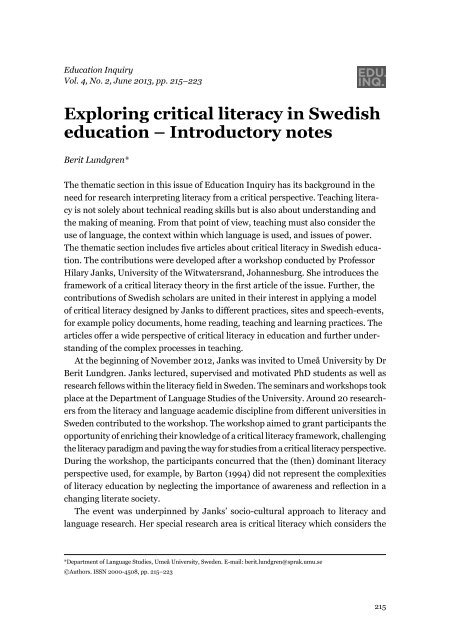Download issue - Umeå universitet
Download issue - Umeå universitet
Download issue - Umeå universitet
You also want an ePaper? Increase the reach of your titles
YUMPU automatically turns print PDFs into web optimized ePapers that Google loves.
Education Inquiry<br />
Vol. 4, No. 2, June 2013, pp. 215–223<br />
EDU.<br />
INQ.<br />
Exploring critical literacy in Swedish<br />
education – Introductory notes<br />
Berit Lundgren*<br />
The thematic section in this <strong>issue</strong> of Education Inquiry has its background in the<br />
need for research interpreting literacy from a critical perspective. Teaching literacy<br />
is not solely about technical reading skills but is also about understanding and<br />
the making of meaning. From that point of view, teaching must also consider the<br />
use of language, the context within which language is used, and <strong>issue</strong>s of power.<br />
The thematic section includes five articles about critical literacy in Swedish education.<br />
The contributions were developed after a workshop conducted by Professor<br />
Hilary Janks, University of the Witwatersrand, Johannesburg. She introduces the<br />
framework of a critical literacy theory in the first article of the <strong>issue</strong>. Further, the<br />
contributions of Swedish scholars are united in their interest in applying a model<br />
of critical literacy designed by Janks to different practices, sites and speech-events,<br />
for example policy documents, home reading, teaching and learning practices. The<br />
articles offer a wide perspective of critical literacy in education and further understanding<br />
of the complex processes in teaching.<br />
At the beginning of November 2012, Janks was invited to <strong>Umeå</strong> University by Dr<br />
Berit Lundgren. Janks lectured, supervised and motivated PhD students as well as<br />
research fellows within the literacy field in Sweden. The seminars and workshops took<br />
place at the Department of Language Studies of the University. Around 20 researchers<br />
from the literacy and language academic discipline from different universities in<br />
Sweden contributed to the workshop. The workshop aimed to grant participants the<br />
opportunity of enriching their knowledge of a critical literacy framework, challenging<br />
the literacy paradigm and paving the way for studies from a critical literacy perspective.<br />
During the workshop, the participants concurred that the (then) dominant literacy<br />
perspective used, for example, by Barton (1994) did not represent the complexities<br />
of literacy education by neglecting the importance of awareness and reflection in a<br />
changing literate society.<br />
The event was underpinned by Janks’ socio-cultural approach to literacy and<br />
language research. Her special research area is critical literacy which considers the<br />
*Department of Language Studies, <strong>Umeå</strong> University, Sweden. E-mail: berit.lundgren@sprak.umu.se<br />
©Authors. ISSN 2000-4508, pp. 215–223<br />
215

















